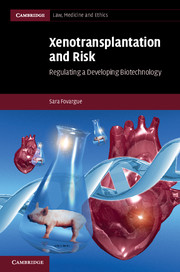Book contents
- Frontmatter
- Contents
- Acknowledgements
- 1 Introducing the issues
- 2 Dealing with risk
- 3 Regulating experimental procedures and medical research
- 4 Regulatory responses to developing biotechnologies
- 5 Challenges to legal and ethical norms: first-party consent and third parties at risk
- 6 Surveillance and monitoring: balancing public health and individual freedom
- 7 Summary and concluding thoughts: looking to the future
- Bibliography
- Index
6 - Surveillance and monitoring: balancing public health and individual freedom
Published online by Cambridge University Press: 05 December 2011
- Frontmatter
- Contents
- Acknowledgements
- 1 Introducing the issues
- 2 Dealing with risk
- 3 Regulating experimental procedures and medical research
- 4 Regulatory responses to developing biotechnologies
- 5 Challenges to legal and ethical norms: first-party consent and third parties at risk
- 6 Surveillance and monitoring: balancing public health and individual freedom
- 7 Summary and concluding thoughts: looking to the future
- Bibliography
- Index
Summary
An inherent risk of xenotransplantation is that known and unknown infectious diseases might be transmitted to the recipient and others, and the implications are such that it is widely recognised that the human and non-human animals involved must be monitored pre- and post-xenotransplant. While an effective and efficient regime is necessary, ‘the importance of the safeguards lies not in their ability to prevent the emergence of infectious diseases – because they are incapable of doing so – but in their ability to provide the foundation for a rapid response to emerging infectious diseases’. Interventions to control infectious diseases include vaccination, medical examination, surveillance, isolation, quarantine, contact tracing and travel restrictions or warnings about travel. Their applicability will depend on the nature of the disease, its ease and method of transmission, the incubation and infectious period and severity of its clinical manifestation. A surveillance regime should identify infectious diseases and prevent their spread; however, xeno-schemes are necessarily limited because it is not currently possible to detect or even know all the diseases which may be transmitted post-xenotransplant. Xenotransplantation is thus similar to SARS which ‘took society back to a pretherapeutic era with no definitive diagnostic test, a nonspecific definition, and no effective vaccine or treatment’. Nevertheless, if a surveillance scheme is to successfully protect individual and public health it ‘must be consistent with public values as expressed in culture and law’ and ‘in times of crisis, the most potent variable distinguishing the community that survives a plague from that which does not is not a community's degree of scientific knowledge but rather its legal system's responsiveness and stability’.
A proposed public health measure should meet five ‘justificatory conditions’: be likely to meet its goal; the probable public health benefits should outweigh any private infringements; be necessary to achieve the goal; be the minimal possible infringement; and be explained and justified to the public. I examine the proposed regimes in the UK, US and Canada to determine whether they can/will protect individual and public health by sufficiently controlling and monitoring xeno-risks, locally, nationally and internationally. These were among the first schemes to be published and are some of the most comprehensive proposed to date. Do they ‘allow for the development of a potentially beneficial new technology, while safeguarding public health’? Experiences with SARS are helpful here to consider the impact and effect of xeno-surveillance regimes, determine their practicability, and the appropriate legal and ethical responses to them. The structure and key elements of xeno-schemes are noted and the particular surveillance xeno-recipients, their contacts, and relevant health workers may be subject to discussion.
- Type
- Chapter
- Information
- Xenotransplantation and RiskRegulating a Developing Biotechnology, pp. 189 - 236Publisher: Cambridge University PressPrint publication year: 2011



